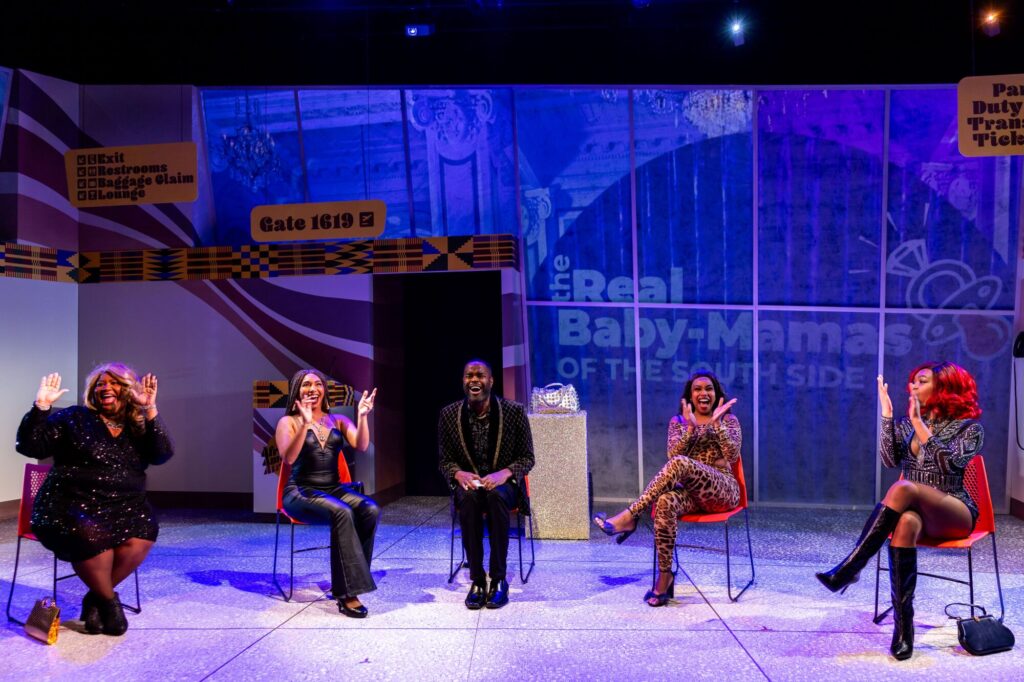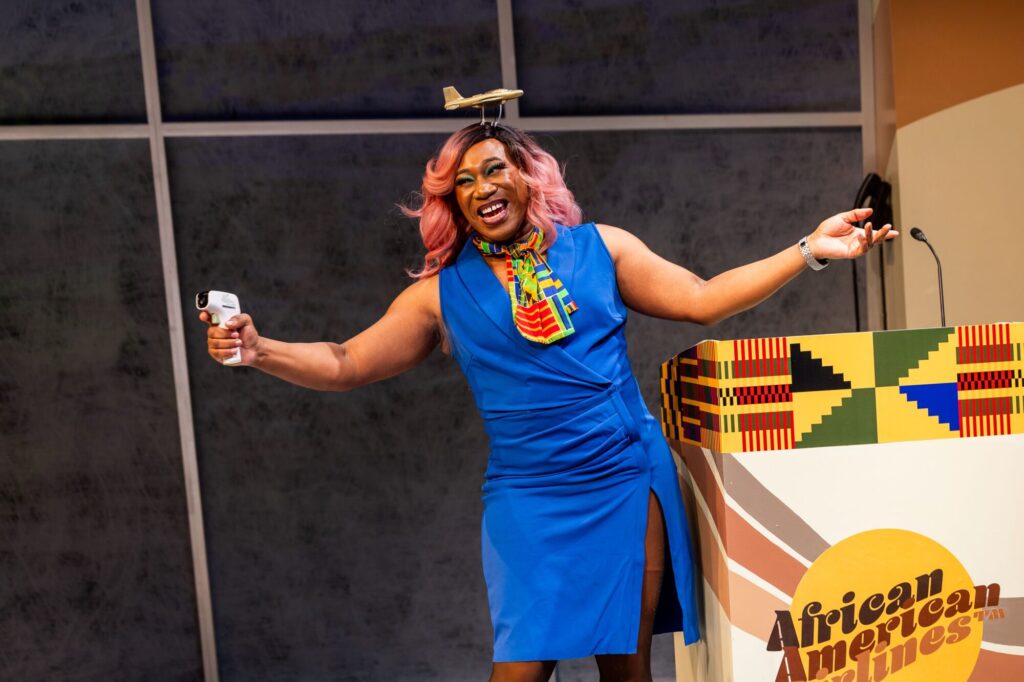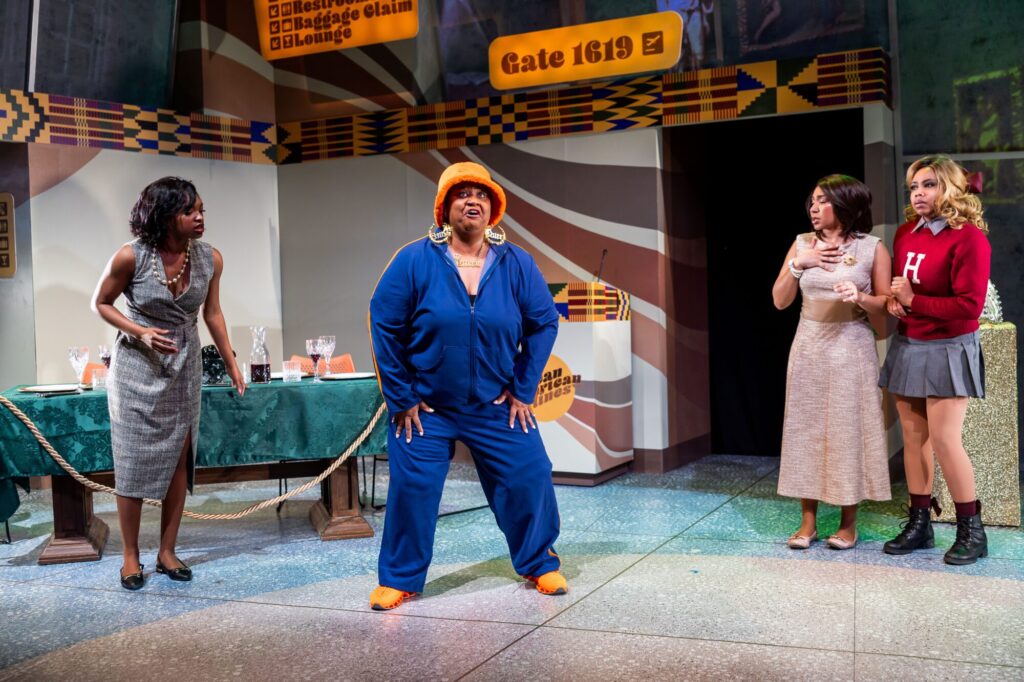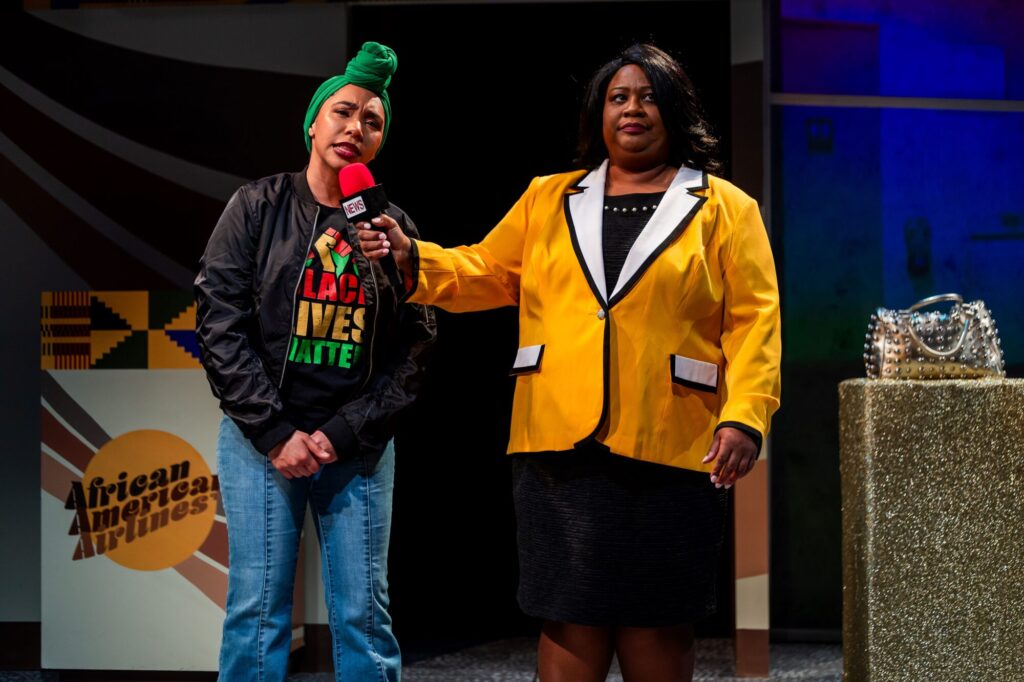
MaConnia Chesser, Kiera Prusmack, De’Lon Grant, Schanaya Barrows, and Dru Sky Berrian.
‘Ain’t No Mo’.’ Written by Jordan E. Cooper. Directed by Dawn M. Simmons. Co-produced by SpeakEasy Stage and Front Porch Arts Collective at the Calderwood Pavilion, 527 Tremont Street, through February 8.
By Shelley A. Sackett
Jordan E. Cooper’s Ain’t No Mo is a complicated, uneven, scathing, audacious, and hilarious rollercoaster ride of a play. It covers a lot of ground, and Cooper dips his pen into the inkwell of every genre known to playwrights: from satire, allegory, fiction, and parody to tragedy and Shakespeare-worthy soliloquy.
Performed as a series of loosely connected vignettes that sometimes change at whiplash speed during 100 intermission-less minutes, this SpeakEasy Stage Company/Front Porch Arts Collective production is guaranteed to spark lively post-theater discussion.
Here’s the premise.
In 2016, with the election of Donald Trump and the end of Barack Obama’s presidency and its promise of Hope and Equality, African Americans descended from slaves are offered a one-way ticket “home” to Dakar, Senegal. A “dedicated observer of equal oppression,” African American Airlines’ Flight 1619 is in the house, or the White House to be more precise. Whether to stay and live life as it is in this country or leave on the “Reparations Flight” and start anew is each individual’s choice.
The government expects this will solve the problem of racism in America once and for all. Almost all eligible Blacks (millions) register to take advantage of the free flight.
What Cooper does with this simple premise, however, is staggering in terms of its brazenness and sheer creative genius. Director Dawn M. Simmons executes with full-throated flamboyance and exaggeration.
The six-actor ensemble switches into many roles easily, aided by Rachel Padula-Shufelt’s fabulous costume design and wig choices. Mac Young’s set design is both flexible and exacting, flowing smoothly between very different settings. Aja M. Jackson’s lighting design and Aubrey Dube’s sound design help create a unifying aesthetic for the show’s differing segments.
Cooper’s no-holds-barred approach is evidenced full blast even before the house lights are fully dimmed. The mild-mannered recording that announces where exits are and what to do in case of an emergency is suddenly interrupted by Peaches, the Flight 1619 airport gate attendant.

“Ladies, gentleman, and those who don’t give a damn. Welcome yo ass to The Roberts Theater. Yessss, we in Boston, bitch! It’s ‘bout time to get this thing started, so I hope you had enough sense and shat before you sat,” she shouts into the sound system.
The rest of the play, which starts with the election of President Obama and ends with Flight 1619 taking off, traces the Black American experience with scenes Cooper chooses to exemplify that jumbled, complicated, painful journey. Like a book of loosely connected short stories, each scene functions independently, yet, taken together, they weave a single cloth.
What unites them is their characters’ reactions to news of the subsidized flight to Africa. Will they stay or leave? And, more importantly, why?
The action opens with “Book of Revelation,” a bang-up of a funeral led by Pastor Freeman (played with over-the-top verve by a terrific De’Lon Grant). It is November 4, 2008, and the Black community has gathered to celebrate Obama’s election and lay Brother Righttocomplain, the embodiment of protest and injustice, to rest.
“Ain’t no mo’ shot down dreams with its blood soaking the concrete,” Freeman bellows. “Ain’t no mo’ riots.”
Now that a Black president has been elected, the unrealistic assumption is that centuries of racism and discrimination will suddenly be reversed and a new era of promise will be escorted in.
The joy and celebration is short-lived. After this gospel-infused scene, the mood and time shifts to 2016 and the election of Trump. White backlash against black Americans and ginned-up fear and resentment will set the next agenda.
Between each plotted scene, we witness morsels of what Peaches (a scene-stealing non-binary Grant Evan) is dealing with as the sole check-in agent for Flight 1619. A larger-than-life drag queen who wears a hot pink wig, Kente scarf, and model airplane-adorned tiara; her role is the play’s only constant through a series of sketches and settings.
She checks in various passengers and offers counsel to those who are hesitant. She also prepares Miss Bag, a suitcase she claims holds “our entire story as a people in this country,” and encourages passengers to drop their stories in the bag so they may bring it to Africa. She warns those who stay behind will be subjected to “extreme racial transmogrification” by “The Powers That Be”: they will be turned into white people.
The audience comes to trust her voice and feel her frustration and angst as she single-handedly supervises boarding millions. She is the reliable narrator, part mother hen and part Greek chorus.

With “Circle of Life,” Cooper tackles the heartbreak of young lives ended by violence and police brutality and the unwillingness of Trisha (Dru Sky Berrian), pregnant by Damien (Grant), to bring a future victim into the world. “A better time is coming. We just have to wait for it,” Damien assures her. Despite his pleas, she is adamant. So are the million other women in line at the Sister Girl We Slay All Day Cause Beyonce Say Community Center, a clinic oasis in a country where abortions are no longer available. Trisha is Number 73,545.
“Real Baby Mamas of the South Side” is a parody of the Real Housewives franchise. This one focused on four black women pretending to have multiple baby daddies and an obsequious host who keeps the provocation flowing. One panelist isn’t even black but is “transracial,’ white Rachel dressed as black Rachonda, “choosing to be herself” and “living her truth” as a black woman.
Tracy, another panelist, breaks character and confronts her. “Race is not a choice. It’s a fact,” she states. Unlike the Rachondas of the world, her skin and the experiences that come with it are NOT optional.
Here, and at many other times, Cooper squanders an opportunity to dig deep into some meaty issues like exploitation, appropriation, stereotyping, ownership, protection of black culture and the tipping point between the humorous and the hateful. Instead, he takes the easy way out, letting the scene devolve into a catfight, leaving the audience unsatisfied and his craftsmanship in question.
In “Green” and “Untitled Prison Play,” Cooper makes his point with more clarity and self-discipline. Each scene features Maconnia Chesser, who anchors and elevates them. In “Green,” Cooper lampoons rich black families who – in this case literally — buried their blackness and partook in the material rewards of assimilation. They have no intention of going anywhere, certainly not to Africa. They have bought into the American Dream, despite its hefty price tag. This is now their America, too.
Chesser plays Black, the human personification of their family’s “blackness,” locked away in the basement by the family’s deceased patriarch for forty years while he became rich. Suddenly, she is set free. She has a lot to say. And she is pissed off.
“Now is the chance to learn who you really are,” she tells them. “I am your family’s black. Come on, we have a plane to catch.” Instead, they plead, threaten and eventually try to shove her back into the basement. No way is this Pandora going back into her box.
Again, the scene devolves into chaos and violence, and again, we are left unsure what point Cooper was trying to make and why.
In “Untitled Prison Play,” the play’s most moving scene, Chesser plays an inmate who can’t leave prison without signing for her possessions and who won’t sign until everything she had when first incarcerated is accounted for and returned. What she’s missing are her joy and a little piece of chaotic peace. Her name. Her place on earth. And, most of all, her smile. Her real smile.
But her choice is stark. Refuse to sign and return to her cell or leave and find herself some new stuff. Like Freedom.
Flight 1619 does finally takes off, but not before Peaches brings down the house with a lightning bolt monologue. There are even last-minute spoilers and pyrotechnics.
When Cooper started Ain’t No Mo, he was just a high school student. Its genesis was in reaction to an incident of police intimidation that rocked and changed him. Its Off-Broadway premiere happened when he was just 24 years old and three years later, Cooper became the youngest Black American to make his Broadway playwriting debut and the youngest Black American playwright ever nominated for a Tony Award. Ain’t No Mo garnered six nominations, including Best Drama, despite its closing after a mere three-week run.
To be sure, Cooper’s play is hardly flawless. It is dated and full of platitudes, pacing issues, and tiresome, gratuitous expletives. It is also in dire need of judicious breadth and length editing.
But Cooper’s pen is a magic wand as well, spinning a smart, confident and grand play out of an undisciplined galaxy of issues and ideas. And when the smoke clears and the stage finally quiets, we’re surprised by the number of important questions left rolling around in our minds, like party favors.

If Miss Bag is the “carrier of our entire story as a people in this country” — the music, art, culture, political ideas, and everything else Blacks have contributed to the American landscape — should it travel to a new destination? Will it reassimilate or hold its owners back, married to an old reality while trying to forge a new one?
When émigrés board a plane, for example, perhaps with just one bag, what do they leave behind? What does the country they leave lose? And after they leave, whose story is theirs to tell? What do we do when the story is over? Perhaps, most importantly, where does freedom fit in if its price is a future without a past?
And these questions are just for starters.
For more information and to buy tickets, visit https://speakeasystage.com/shows/2025/01/aint-no-mo/

